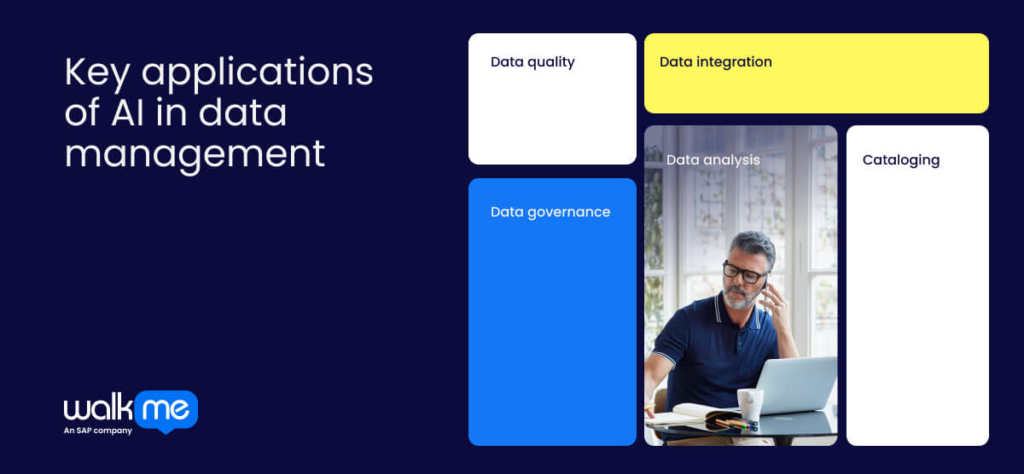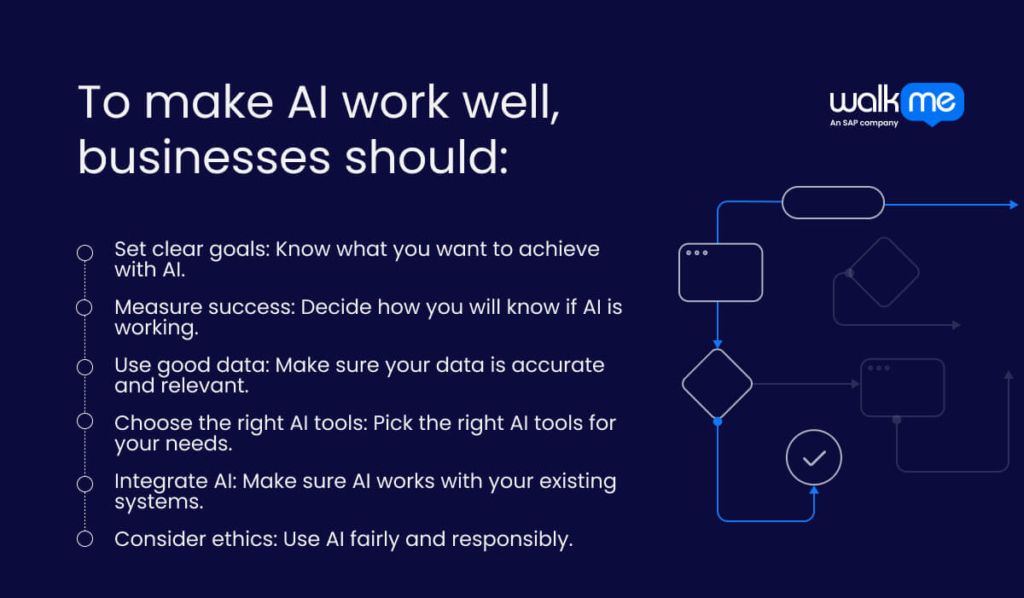Companies now see data as a critical asset, and effective management is key to unlocking its value. Many have invested in clear data architecture strategies and quality measures, boosting data usage.
However, as data volumes and diversity grow, management becomes more complex and time-consuming. This can lead to insight delays, limited user access, and data quality issues.
To cope, some data users take matters into their own hands. For instance, data scientists often handle tedious tasks like data cleaning, which frustrates and wastes valuable resources.
Instead of hiring more staff, AI offers a cost-effective solution. An AI automation platform can help with tasks like anomaly detection, data quality checks, and data tracing. This article explores how AI enhances data management, its applications, and its impact on future roles.
What is AI data management?
AI in data management is a process that uses artificial intelligence to collect, store, and use data securely and efficiently. It helps organizations make better decisions with short- and long-term benefits. AI speeds up data collection, boosts accuracy, reduces costs, and allows teams to focus on valuable tasks.
As data needs evolve, organizations now treat data as a product for internal and external use. Data sharing and decentralization are more common. Growing demand for data fabric solutions has led to a need for automated data integration. AI meets this need by simplifying complex processes and accelerating data workflows from start to finish.
How is AI used for data management?
You can use AI for data management to automate routine tasks, reduce errors, and free up human resources. AI improves data quality, enhances discoverability, ensures consistency, and supports security and compliance.
Traditional systems were built for structured data. However, these systems struggle with today’s high-volume, fast-moving, and unstructured data. Maintaining data quality often requires significant manual work.
AI changes this.
AI-powered tools, like predictive analytics and natural language processing (NLP), process large amounts of data quickly.
This can help people make faster, more accurate decisions. Even more, it can find patterns that humans might miss and predict future trends. AI also adjusts instantly to new information.
Key applications of AI in data management

Many industries, such as healthcare, media, and finance, use AI-enabled data management solutions. These solutions help them solve their data management problems.
Here are the main ways they apply AI:
Data quality
Data quality refers to the health of your data. It’s important because bad data can lead to bad decisions. Good data is accurate, complete, and up-to-date.
AI can help improve data quality by:
- Finding and fixing errors: AI can spot mistakes like typos, missing information, and inconsistencies.
- Cleaning up data: AI can remove duplicate data and standardize formats.
- Predicting problems: AI can learn from past mistakes to prevent future errors.
- Enriching data: AI can add valuable information to your data.
By using AI, you can ensure that your data is clean, accurate, and reliable.
Data integration
Data integration is like putting together a puzzle. It combines data from different sources to make a complete picture. This helps businesses understand what’s happening and make better decisions.
AI can make data integration easier and more accurate. It can:
- Automate tasks: AI can do repetitive tasks, like finding connections between data and changing it into a common format.
- Improve accuracy: AI can spot mistakes in data and fix them.
- Standardize data: AI can make sure that data from different sources is in the same format.
By using AI, businesses can save time and get more accurate insights from their data.
Data governance
AI helps keep data safe and secure.
It can:
- Enforce policies: AI can check if data is being used correctly and if it follows the rules.
- Identify sensitive information: AI can find important data that needs to be protected.
- Detect threats: AI can spot potential attacks and security breaches.
- Monitor for anomalies: AI can find unusual activity that might be harmful.
While AI is a powerful tool, it’s important to remember that it needs human oversight. People still need to review the findings of AI and make final decisions.
Data analysis
AI plays a big role in data analysis. With the rise of GPT, more tools now use natural language processing (NLP) in data analytics. NLP techniques can analyze text from social media, customer feedback, and documents.
AI-powered NLP can help with tasks like classifying text. It can also analyze sentiment, recognize named entities, summarize text, and model topics. The goal is to organize and analyze text data effectively. AI can group similar data together using clustering algorithms.
Basic techniques like decision trees and regression analysis are important in data analysis. AI-powered machine learning models can quickly create complex decision trees, even with large datasets. AI can automatically find patterns, trends, and insights in big data.
Machine learning algorithms can also reveal hidden relationships. They can also create data visualizations and support data-driven decisions.
Cataloging
A data catalog is like a library catalog for data. It helps you find and understand your data.
AI can make data catalogs even better by:
- Finding data: AI can search for data sources and classify them.
- Creating metadata: AI can create descriptions of data, like its source, format, and who owns it.
- Smart searching: AI can help you find data quickly by suggesting relevant sources.
- Automating tagging: AI can automatically label data, like identifying a social security number.
With AI, data catalogs become more powerful tools for managing and understanding your data.
How will AI impact data management roles?
AI is changing the way we work with data. It can perform boring tasks like cleaning data, allowing people to focus on more important things. This can make work more satisfying and open up new job opportunities.
New jobs are being created, like chief AI officer. These people help businesses use AI to its full potential. Data professionals can also learn new skills, like data engineering and managing AI systems.
AI will take on more data tasks, but people will still be important. They will check the information that AI finds to ensure its accuracy. This partnership between humans and AI will make work more efficient and effective.
Increase the efficiency of your workplace with AI data management
AI can make businesses work more efficiently.
For example, in managing people and data, AI can:
- Automate tasks: AI can do simple tasks like cleaning up data, so IT teams can focus on more important things.
- Improve security: AI can watch how people use systems and find ways to make them safer.
In managing products and supply chains, AI can:
- Optimize inventory: AI can help businesses keep the right amount of products on hand, reducing waste and responding to changes in the market faster.
- Predict employee turnover: AI can analyze employee data to see who might leave and why.

To make AI work well, businesses should:
- Set clear goals: Know what you want to achieve with AI.
- Measure success: Decide how you will know if AI is working.
- Use good data: Make sure your data is accurate and relevant.
- Choose the right AI tools: Pick the right AI tools for your needs.
- Integrate AI: Make sure AI works with your existing systems.
- Consider ethics: Use AI fairly and responsibly.
By following these steps, businesses can use AI to improve their data ecosystem and stay competitive.
The future of AI in data management
The emerging trends in AI data management you need to know about are:
AI-driven data platforms
AI is helping businesses work smarter with data. AI-powered data platforms make it easier to make decisions, use AI tools, and stay competitive.
How does it work?
- Teamwork: These platforms bring data scientists and engineers together, saving time and money.
- Smart Models: AI can create models that show how data is connected. This saves time for data scientists and makes the models more accurate.
- Clean Data: AI can find and fix mistakes in large datasets, making the data more reliable.
- Better Design: AI can suggest the best way to organize databases. This makes things more efficient, especially for industries with lots of complex data like finance, healthcare, and online shopping.
Overall, AI-powered data platforms are making data management more efficient and effective.
AI and predictive analytics
AI and predictive analytics are changing how we use data. They can do tasks automatically, make things more accurate, and help us understand data better.
How do they help?
- Speed: They can process data faster.
- Accuracy: They can reduce mistakes.
- Cost: They can save money.
- Quality: They can improve the quality of data.
AI learns from the past to predict the future. It can spot patterns in data and predict problems before they happen, helping us make better decisions and save time.
Predictive analytics uses machine learning to find trends and unusual patterns in data. This can help us identify problems with data quality. For example, it can help banks detect fraud and doctors analyze health data more effectively.
Overall, AI and predictive analytics make data processing more efficient and accurate.
AI integration with IoT and blockchain
Combining blockchain, IoT, and AI is important for future technology.
For instance:
- Blockchain makes data safe and clear, which is great for things like finance and shipping.
- IoT connects devices to collect and share data, making things more efficient and accurate.
Together, blockchain and IoT create a secure network for data, allowing devices to share data safely. Then, AI analyzes this data to find useful information and improve how things work.
These technologies can be used in many areas. They can improve supply chain management, manufacturing, and healthcare. It also makes things more secure and efficient.
Choose AI to continually revolutionize data management
Data management is important for businesses. It helps prevent problems like delays, wrong information, and lost data.
Managing data takes time and effort. It includes cleaning, organizing, and combining data, which can be frustrating for both data scientists and other workers.
AI can help with data transformation. It can improve data quality, make data easier to use, and help find the right information.
People are still needed for data management. Employees create and use data, while data experts design, protect, and organize it. It’s important to decide how AI and people will work together to manage data effectively.

